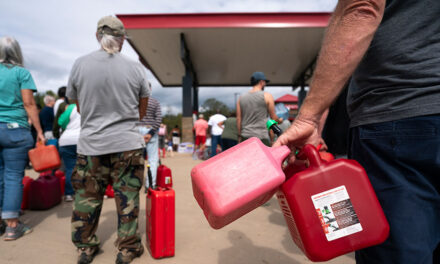We support our Publishers and Content Creators. You can view this story on their website by CLICKING HERE.
Municipal water infrastructure completely destroyed in aftermath of Hurricane Helene
Hurricane Helene may have completely flooded many parts of North Carolina, but residents are struggling to find enough water to drink thanks to extensive damage to water infrastructure.
Federal officials have said that the damage to water utilities from the storm and related flooding is so severe and spans such a broad inland area that it “could be considered unprecedented.” As of the end of last week, more than 1.8 million people were under a boil water advisory, while 136,000 people living in the southeast were served by non-operational water providers.
In Asheville, raging floodwaters destroyed the pipes that bring water from the reservoir in the mountains to supply the system, while crews need to rebuild a road before they can reach another reservoir that the storm knocked offline. Although a boost in output from the city’s third source of water restored the flow in some Asheville neighborhoods, hospitals cannot resume normal operations, and hotels, schools and restaurants may be forced to keep their doors closed until full repairs can take place. It could take weeks or even months before water is fully restored.
It is not just drinking water that is in short supply; non-drinkable water is also difficult to obtain. The situation is particularly challenging for those living in apartments who struggle to haul buckets of water up multiple flights of stairs so they can flush their toilet.
Buncombe County Register of Deeds Drew Reisinger said: “One thing no one is talking about is the amount of poop that exists in every toilet in Asheville. We are dealing with a public health emergency.”
Naturally, this is a situation that becomes even more threatening as it continues. For example, even those who are following boil water advisories could become ill as even small mistakes boiling the water can lead to stomach illnesses.
Asheville physician Dr. Carly Brown told The Epoch Times: “We need portable water … nobody can flush their toilets, nobody can take a shower, nobody can do laundry. We have no water and the infrastructure for that water is totally destroyed.”
One local disaster relief worker told the publication that there is no running water in the city at all.
Another big problem is ruptured water pipes. Many water pipes run underneath roads, and floodwaters have caused extensive damage to the area’s roads and the pipes running under them. Those with private wells are also suffering as many pumps have lost power. In addition, overtopping floodwaters sometimes contaminate wells.
This situation underscores the importance of having water filters as part of your preparedness kit. In this case, many of those suffering were not even directly hit by the storm. There are so many ways that water infrastructure can become damaged, whether it happens by accident or due to sabotage, and water filters can help people drink safely from alternative sources of water when necessary. It’s something that can truly be a lifesaver when the unexpected happens.
Food donation effort update: 10 pallets of organic survival food reaching victims today
There are so many people in need right now, and the Health Ranger’s food donation fundraiser has now surpassed $300,000. We’ve already sent a truckload of 10 pallets of organic survival food to a local regional airport staging area, and it is now being distributed by helicopter. We expect to send at least 20 more pallets in the coming days.
Through midnight on Monday, for every survival food bucket customers buy from the Health Ranger Store, we will donate an additional one to disaster victims.
Sources for this article include:

 Conservative
Conservative  Search
Search Trending
Trending Current News
Current News 





